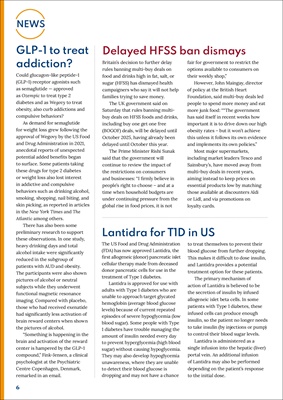
6
NEWS
GLP-1 to treat
addiction?
Could glucagon-like peptide-1
(GLP-1) receptor agonists such
as semaglutide - approved
as Ozempic to treat type 2
diabetes and as Wegovy to treat
obesity, also curb addictions and
compulsive behaviors?
As demand for semaglutide
for weight loss grew following the
approval of Wegovy by the US Food
and Drug Administration in 2021,
anecdotal reports of unexpected
potential added benefits began
to surface. Some patients taking
these drugs for type 2 diabetes
or weight loss also lost interest
in addictive and compulsive
behaviors such as drinking alcohol,
smoking, shopping, nail biting, and
skin picking, as reported in articles
in the New York Times and The
Atlantic among others.
There has also been some
preliminary research to support
these observations. In one study,
heavy drinking days and total
alcohol intake were significantly
reduced in the subgroup of
patients with AUD and obesity.
The participants were also shown
pictures of alcohol or neutral
subjects while they underwent
functional magnetic resonance
imaging. Compared with placebo,
those who had received exenatide
had significantly less activation of
brain reward centers when shown
the pictures of alcohol.
"Something is happening in the
brain and activation of the reward
center is hampered by the GLP-1
compound," Fink-Jensen, a clinical
psychologist at the Psychiatric
Centre Copenhagen, Denmark,
remarked in an email.
Delayed HFSS ban dismays
Britain's decision to further delay
rules banning multi-buy deals on
food and drinks high in fat, salt, or
sugar (HFSS) has dismayed health
campaigners who say it will not help
families trying to save money.
The UK government said on
Saturday that rules banning multibuy
deals on HFSS foods and drinks,
including buy one get one free
(BOGOF) deals, will be delayed until
October 2025, having already been
delayed until October this year.
The Prime Minister Rishi Sunak
said that the government will
continue to review the impact of
the restrictions on consumers
and businesses: "I firmly believe in
people's right to choose - and at a
time when household budgets are
under continuing pressure from the
global rise in food prices, it is not
fair for government to restrict the
options available to consumers on
their weekly shop,"
However, John Maingay, director
of policy at the British Heart
Foundation, said multi-buy deals led
people to spend more money and eat
more junk food: ""The government
has said itself in recent weeks how
important it is to drive down our high
obesity rates - but it won't achieve
this unless it follows its own evidence
and implements its own policies."
Most major supermarkets,
including market leaders Tesco and
Sainsbury's, have moved away from
multi-buy deals in recent years,
aiming instead to keep prices on
essential products low by matching
those available at discounters Aldi
or Lidl, and via promotions on
loyalty cards.
Lantidra for T1D in US
The US Food and Drug Administration
(FDA) has now approved Lantidra, the
first allogeneic (donor) pancreatic islet
cellular therapy made from deceased
donor pancreatic cells for use in the
treatment of Type 1 diabetes.
Lantidra is approved for use with
adults with Type 1 diabetes who are
unable to approach target glycated
hemoglobin (average blood glucose
levels) because of current repeated
episodes of severe hypoglycemia (low
blood sugar). Some people with Type
1 diabetes have trouble managing the
amount of insulin needed every day
to prevent hyperglycemia (high blood
sugar) without causing hypoglycemia.
They may also develop hypoglycemia
unawareness, where they are unable
to detect their blood glucose is
dropping and may not have a chance
to treat themselves to prevent their
blood glucose from further dropping.
This makes it difficult to dose insulin,
and Lantidra provides a potential
treatment option for these patients.
The primary mechanism of
action of Lantidra is believed to be
the secretion of insulin by infused
allogeneic islet beta cells. In some
patients with Type 1 diabetes, these
infused cells can produce enough
insulin, so the patient no longer needs
to take insulin (by injections or pump)
to control their blood sugar levels.
Lantidra is administered as a
single infusion into the hepatic (liver)
portal vein. An additional infusion
of Lantidra may also be performed
depending on the patient's response
to the initial dose.